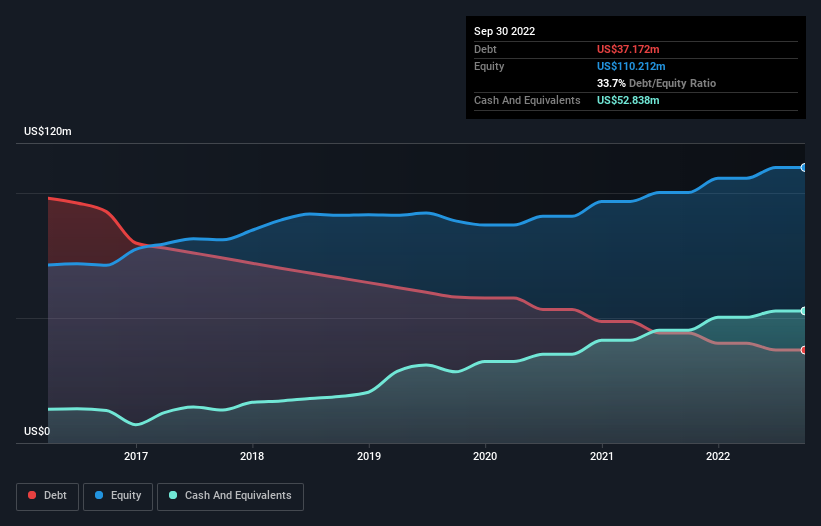
The external fund manager backed by Berkshire Hathaway's Charlie Munger, Li Lu, makes no bones about it when he says 'The biggest investment risk is not the volatility of prices, but whether you will suffer a permanent loss of capital.' When we think about how risky a company is, we always like to look at its use of debt, since debt overload can lead to ruin. Importantly, Singapore Shipping Corporation Limited (SGX:S19) does carry debt. But the real question is whether this debt is making the company risky.
When Is Debt A Problem?
Generally speaking, debt only becomes a real problem when a company can't easily pay it off, either by raising capital or with its own cash flow. If things get really bad, the lenders can take control of the business. However, a more frequent (but still costly) occurrence is where a company must issue shares at bargain-basement prices, permanently diluting shareholders, just to shore up its balance sheet. Of course, plenty of companies use debt to fund growth, without any negative consequences. When we examine debt levels, we first consider both cash and debt levels, together.
View our latest analysis for Singapore Shipping
What Is Singapore Shipping's Debt?
The image below, which you can click on for greater detail, shows that Singapore Shipping had debt of US$37.2m at the end of September 2022, a reduction from US$44.0m over a year. But it also has US$52.8m in cash to offset that, meaning it has US$15.7m net cash.

How Healthy Is Singapore Shipping's Balance Sheet?
The latest balance sheet data shows that Singapore Shipping had liabilities of US$14.1m due within a year, and liabilities of US$58.5m falling due after that. Offsetting these obligations, it had cash of US$52.8m as well as receivables valued at US$4.83m due within 12 months. So its liabilities outweigh the sum of its cash and (near-term) receivables by US$14.9m.
Singapore Shipping has a market capitalization of US$71.8m, so it could very likely raise cash to ameliorate its balance sheet, if the need arose. However, it is still worthwhile taking a close look at its ability to pay off debt. While it does have liabilities worth noting, Singapore Shipping also has more cash than debt, so we're pretty confident it can manage its debt safely.
Singapore Shipping's EBIT was pretty flat over the last year, but that shouldn't be an issue given the it doesn't have a lot of debt. The balance sheet is clearly the area to focus on when you are analysing debt. But it is Singapore Shipping's earnings that will influence how the balance sheet holds up in the future. So when considering debt, it's definitely worth looking at the earnings trend. Click here for an interactive snapshot.
Finally, a business needs free cash flow to pay off debt; accounting profits just don't cut it. While Singapore Shipping has net cash on its balance sheet, it's still worth taking a look at its ability to convert earnings before interest and tax (EBIT) to free cash flow, to help us understand how quickly it is building (or eroding) that cash balance. Over the last three years, Singapore Shipping actually produced more free cash flow than EBIT. That sort of strong cash conversion gets us as excited as the crowd when the beat drops at a Daft Punk concert.
Summing Up
While Singapore Shipping does have more liabilities than liquid assets, it also has net cash of US$15.7m. And it impressed us with free cash flow of US$20m, being 196% of its EBIT. So is Singapore Shipping's debt a risk? It doesn't seem so to us. There's no doubt that we learn most about debt from the balance sheet. However, not all investment risk resides within the balance sheet - far from it. For instance, we've identified 5 warning signs for Singapore Shipping (1 is a bit unpleasant) you should be aware of.
Of course, if you're the type of investor who prefers buying stocks without the burden of debt, then don't hesitate to discover our exclusive list of net cash growth stocks, today.
New: Manage All Your Stock Portfolios in One Place
We've created the ultimate portfolio companion for stock investors, and it's free.
• Connect an unlimited number of Portfolios and see your total in one currency
• Be alerted to new Warning Signs or Risks via email or mobile
• Track the Fair Value of your stocks
Have feedback on this article? Concerned about the content? Get in touch with us directly. Alternatively, email editorial-team (at) simplywallst.com.
This article by Simply Wall St is general in nature. We provide commentary based on historical data and analyst forecasts only using an unbiased methodology and our articles are not intended to be financial advice. It does not constitute a recommendation to buy or sell any stock, and does not take account of your objectives, or your financial situation. We aim to bring you long-term focused analysis driven by fundamental data. Note that our analysis may not factor in the latest price-sensitive company announcements or qualitative material. Simply Wall St has no position in any stocks mentioned.
About SGX:S19
Singapore Shipping
An investment holding company, owns and manages ships in Singapore, Japan, and internationally.
Flawless balance sheet, good value and pays a dividend.
Market Insights
Community Narratives



